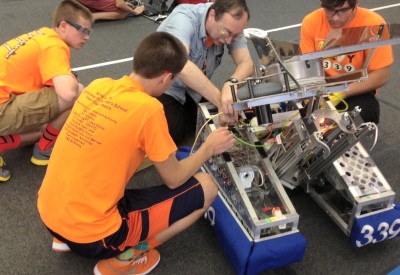
Commonwealth Virginia Governor's School students and their mentor, Bob Brown - a computer scientist supporting Naval Surface Warfare Center Dahlgren Division (NSWCDD) as a contractor - work to reset the student-built robot known as Kilroy before a match at "Duel on the Delaware 2013". The National Defense Education Program sponsored high school team and its allies did not make the top three among 34 high schools in the competition. However, the team's technology skills are number one, say their NSWCDD mentors. (U.S. Navy photo by James R. Smith/Released)
CARNEYS POINT TOWNSHIP, N.J.—A Navy-mentored high school team's robot competed feverishly against 31 other robots to throw Frisbees for the most goals on a field here Oct 19.
But the Commonwealth Virginia Governor's School robot wasn't alone.
It formed an alliance with robots controlled by students from two other high schools.
The alliance—one of 11 groups formed by high school teams—played a game called, "Ultimate Ascent". True to its name, the Frisbee game was not over until the robots ascended, or attempted to ascend, metal pyramids.
The National Defense Education Program (NDEP) sponsored high school team, known as "Kilroy", and its allies did not make the top three among 34 high schools in the "Duel on the Delaware 2013". However, the team's technology skills are number one, say their Naval Surface Warfare Center Dahlgren Division (NSWCDD) mentors.
"It's more than a Frisbee game between robots," said NSWCDD computer engineer Jim Smith. "We consider our Commonwealth Virginia Governor's School team victorious because they excelled at designing and building their own robot with the science, technology, planning and teamwork skills that will serve them well in their future careers. These are the skills required to provide our warfighters with the best fleet in the world. We need future scientists and engineers to design, build and support the fleet into the next century."
Billed as an intensive, hands-on, team-based engineering experience, "Duel on the Delaware" was part of FIRST (For Inspiration and Recognition of Science and Technology), a non-profit organization with the mission to design accessible, innovative programs to build self-confidence, knowledge and life skills while motivating young people to pursue opportunities in science, technology and engineering.
"The FIRST program's ability to build excitement through competitions draws the students into the STEM (science, technology, engineering and mathematics) aspects of the program," said John Wright, NSWCDD STEM Coordinator. "The other aspect that we see as attractive for future scientists and engineers is the program's focus on team work. We have seen teams pull a part off their own robot to provide to another team in need of that part in order to compete. That level of teamwork is what we look for in engineers and scientists that support our mission at the Navy Warfare Centers -- and we see FIRST developing it in future generations."
It took teamwork for the students to design and build their robots under the guidance of their teachers and mentors prior to competing at the offseason tournament. Ultimate Ascent - a game played by two competing alliances on a 27 x 54 foot field - featured alliances comprising three robots, striving to throw the most discs into their goals.
Kilroy—officially called "FIRST Team 339"—includes high school students from Virginia's Stafford, Spotsylvania, Caroline and King George Counties. The Governor's School team is now working with three NSWCDD scientist and engineer volunteers, including Smith to prepare for their next competition Nov. 2 at Battlefield High School in Haymarket, Va.
"This is the offseason for the FIRST teams with new students competing to learn the system and understand the rigors of competition at this level," said Wright. "The real season begins with the new challenge in January."
Offseason FIRST (For Inspiration and Recognition of Science and Technology) events such as "Duel on the Delaware" prepares students for the official FIRST Robotics Competition that kicks off in January and culminates in a world championship in late April.
FIRST is one of many STEM programs that NSWC Dahlgren volunteers participate in to show a diversity of pre-teens and teens that math, science and engineering are fascinating, fun and socially relevant.
Since 2004, Navy scientists and engineers at Dahlgren have been working with teachers and parents under the sponsorship of the NDEP and other sponsors to engage students with hands-on learning and generate STEM enthusiasm.
The goal of FIRST and NDEP is the same—motivate and encourage students to pursue careers in science, technology, engineering and mathematics.
The Virginia-based affiliate of FIRST works with its "program partners to deliver hands-on project-based learning programs and activities to over 5,000 children in kindergarten through 12th-grade," according to the organization's website at www.virginiafirst.org.
In addition to technical skills, students are gaining significant business, marketing and relationship experience as their teams prepare to compete.
Mentors and students work year-round with other local teams to collaborate and generate ideas for fundraising, business planning and building a competitive robot. The fundraising supports competitions and other STEM activities. For example, registration for the FIRST Robotics Competition is normally $5,000.
Robotics team members build their teams from the September to December "team building season". During this time, students focus on fundraising, grant writing, publicity, learning skills for the upcoming season, developing team image and community outreach, which includes public relations events for the team and fundraising for community causes.
Next is the "build season". The teams have six-and-a-half weeks from January to mid-February to build their robot.
"Competition season" runs from February to April.
NSWC Dahlgren scientists and engineers also mentor the Fredericksburg, Va., James Monroe High School robotics team which competes - with the Virginia Governor's School Kilroy team - at the FIRST Virginia Regional Robotics Competition at the Virginia Commonwealth University Siegel Center. All FIRST Robotics Competition regionals and tournaments are free and open to the public.


